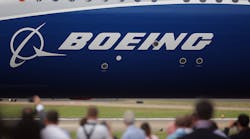General Electric Co. said it remains to be convinced that demand for Boeing Co.’s planned mid-range aircraft, nicknamed the 797, will be sufficient for it to justify developing a new engine for the jet.
The U.S. industrial conglomerate needs to do further work on the proposals, especially since Boeing has yet to decide whether to recruit an exclusive turbine provider or involve two competing suppliers, GE Aviation chief David Joyce said Monday at the Farnborough air show.
“We’re still wrestling with what the size of the market is,” Joyce said in a media briefing. “People feel great when you launch, but shareholders don’t feel great until you’re successful.”
Boeing is working on the 797, a so-called New Mid-market Aircraft or NMA, as it seeks a successor to its 757 and 767 models and a means of halting the success of Airbus SE in edging into the niche with its popular A321neo. The U.S. planemaker is mulling a two-jet family with 220 to 270 seats designed for 5,000-mile routes, available by 2025.
Boeing CEO Dennis Muilenburg said in an interview at the expo that with a decision yet to be taken on launching the NMA, a judgment on the number of engine suppliers probably won’t be taken until next year. He said his company is evaluating all options for the turbines and having productive discussions.
CFM Bid
Boston-based GE would bid for the engine contract through CFM International, its joint venture with Safran SA of France, even if the NMA engine is required to exceed the 50,000 pounds of thrust that represents the upper end of the alliance’s agreed remit.
“Even if it sneaks a little bit north of 50,000 thrust, we would still consider it to be in the spirit of the JV,” he said. “We are very respectful of the spirit of the JV and not the letter.” It’s also yet to be determined how many variants of the NMA there’ll be and what range of propulsion will be required, he said.
Joyce said in an interview that GE turned down an opportunity to join Chicago-based Boeing in a joint venture to develop auxiliary power units that help start jet engines and provide electricity while planes are on the ground because it preferred to allocate capital elsewhere.
Safran opted to join Boeing in the venture, which will challenge United Technologies Corp. and Honeywell International Inc., the leading manufacturers in the APU market.
By Benjamin Katz, Kaye Wiggins and Christopher Jasper



